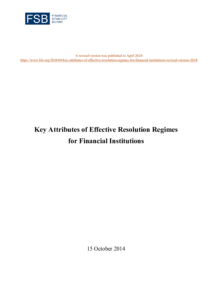This guidance was originally published on 18 August 2016. A supplementary note has now been added to the original guidance.
Critical shared services, such as information technology infrastructure and software-related services, are necessary to support the continued provision of a financial institution’s critical functions.
The FSB Guidance on Arrangements to Support Operational Continuity in Resolution, originally published in 2016, sets out arrangements to support the continuity of those services in the event of resolution. The guidance assists supervisory and resolution authorities and financial institutions to evaluate whether financial institutions that are subject to resolution planning requirements have appropriate arrangements to support operational continuity if the firm enters resolution. It covers legal, contractual and governance frameworks, resourcing, management information systems and financial resources.
As part of the digitalisation of the financial services sector, financial institutions have increased their dependencies on third-party service providers in supporting critical shared services in recent years. This can bring multiple benefits to financial institutions, including flexibility, innovation and improved operational resilience. However, if not properly managed, disruption to critical shared services could affect the continued provision of critical functions, posing risks to orderly resolution and, in some cases, financial stability.
The 2016 Guidance has been issued to include a supplementary note on the digitalisation of critical shared services as an addendum. The supplementary note does not create any new guidance or requirements. Rather, it specifies, for each section of the 2016 Guidance, how authorities and firms should think about the continuity of critical shared services in resolution when those services are digital.
